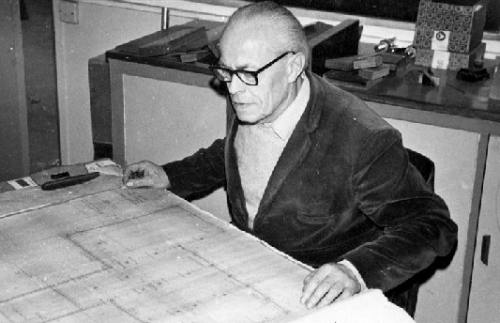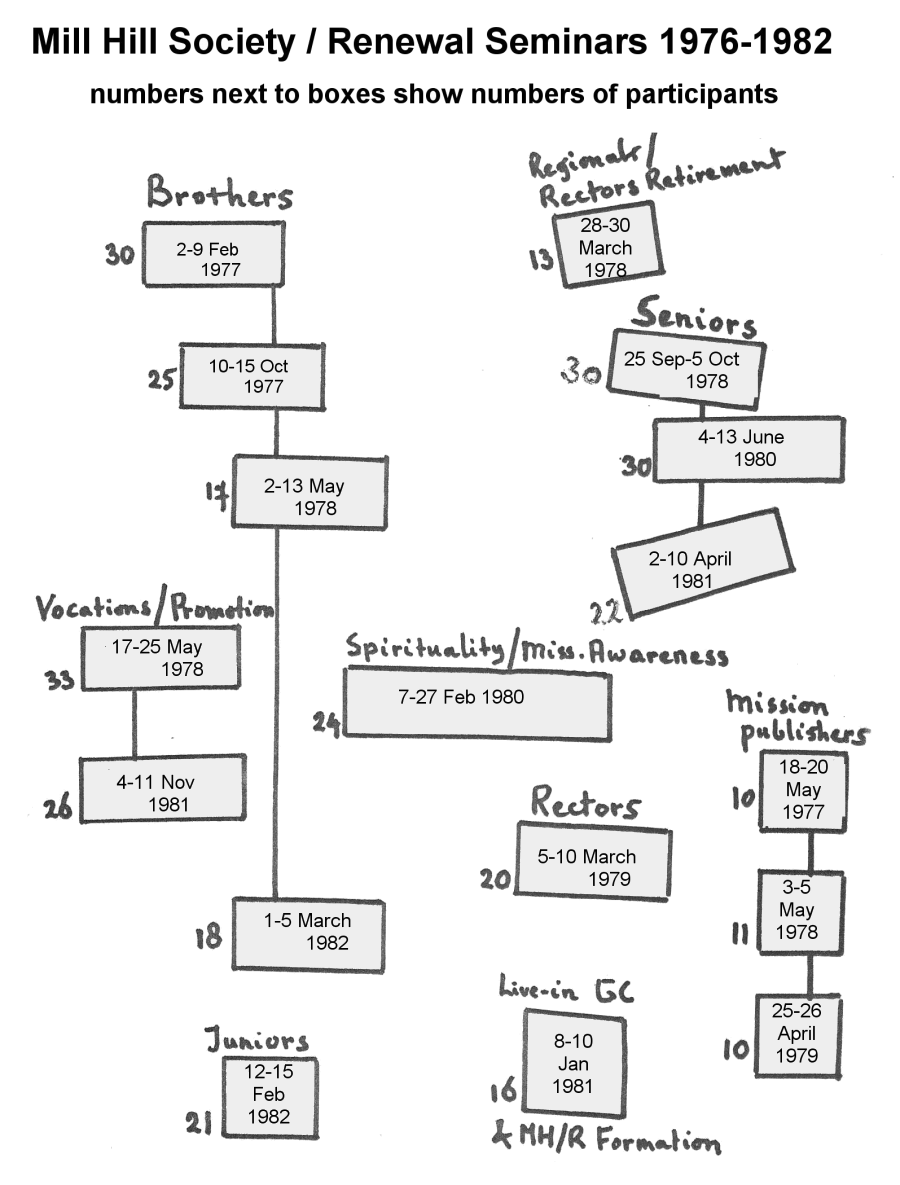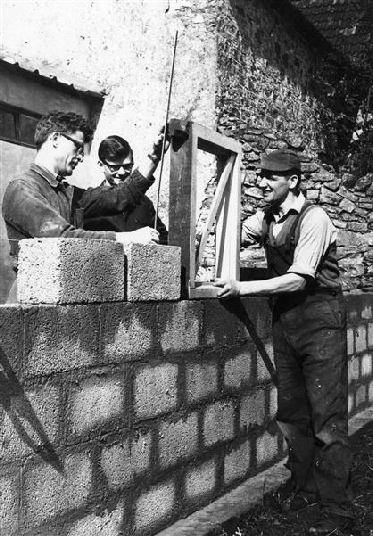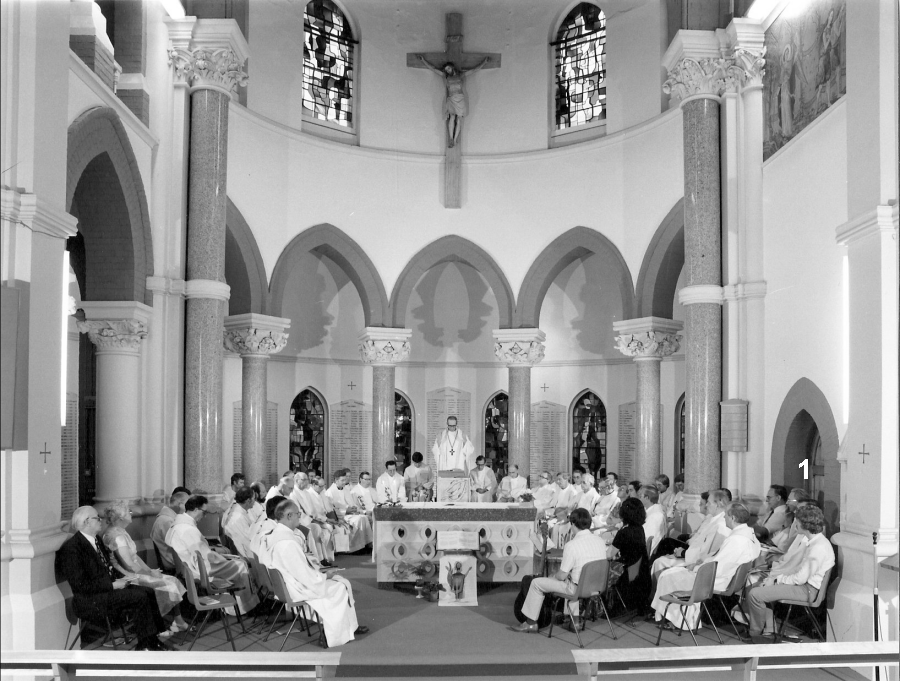Brothers and Associates
Our lay brothers formed another important group under my care in the Mill Hill home regions. Our brothers were involved in an incredibly wide range of activities on the missions: the construction of churches, schools and hospitals; running workshops for the repair of cars and motorcycles; administering church institutions; looking after diocesan and society accounts; maintaining industrial colleges; you name it. But also in the home countries they played a key role.
Many of our houses of formation depended on farms attached to the house: Hoorn, Tilburg, Freshford, Brixen, Johannahoeve in Oosterbeek and Mill Hill College itself, to mention but a few. All these were run by capable brothers. Other brothers looked after gardens and sport fields. Others again were in administration, recruitment and promotion, or support activities in our 28 Mill Hill houses. Without any doubt, our brothers were making a great contribution to the Society’s survival in the home countries.

One of our senior brothers from Tyrol: Leonard Glatzl
But the question was: were the brothers treated with fairness? I am first of all referring to the fact that in some traditional Catholic areas like South Tyrol, Ireland and the North East of England, they were not considered ‘equal’ by members of the Society who were priests. At times they were indeed considered cheap labour rather than individuals who deserved as much respect and support as any priest. Some rectors of houses would just order them about, and refuse to allow them to mix with priests. They were seated at a special table in the refectory, and were never invited to share in the Saturday evening ‘drink’ in the members’ lounge.
I was aware of this problem, having taught a group of brothers for 18 months before my departure to India. So I tried to redress the situation in various Mill Hill communities as much as I could. I also wrote an article ‘Missionary Brother: a Happy Vocation’ for the Millhilliana (read by society members) and Mission Outlook (for the general public). I published a small booklet, detailing the lives of 14 canonised lay brothers. Its final pages carried an interview with a deceased Mill Hill brother who ‘now reigns as a saint in heaven – he prefers to remain anonymous’. It starts like this:
“Question: Brother, how come that you have not been canonized?
Reply: ‘Perhaps you should ask God. However, I have thought about it. I believe that our Society has more urgent things to do than waste time on earth trying to get our members canonized. When I study the situation here in heaven, it is clear that our Society is not worse off than other Orders or Missionary Societies . . .’.”
Another ground for concern about fairness with regard to our lay brothers lay elsewhere. It was often forgotten that brothers looking after pigs or cows in our farms or doing maintenance work in our buildings were actually missionaries: persons who had joined our Society to render service in Third-World missions. Of course, doing support work at home needed to be done to enable our missions abroad to function properly. But what about the individual? What if a brother running a farm was simply expected to do that job for the rest of his life? Was it fair for him?
We had a number of brothers to whom this question applied. I do not want to mention names here, but I discussed the issue with many of them. In some cases, if the brother was still young enough, we could release him from his work in the home region and send him for a spell to work in a mission country – even if this meant entrusting the farm for some years to a paid outsider. In quite a few other cases, we worked out a compromise through consultation with the particular brother and specific mission superiors. The brother involved would retain charge of the home farm but would be sent on discovery journeys to a particular mission for shorter periods of 4 to 6 weeks. This gave him the chance to see with his own eyes how missions functioned. The scheme was a success.
In-service training
Just like our other members, our brothers were badly in need of training. They too were confused, and at times, upset by the change of the religious climate in Europe and North America which I have described in the previous two chapters.
I paid special attention to this during my visitations. When interviewing individual brothers I would try to alleviate their fears. I organized updating conferences for them in the various home countries. I also called them together from all the home regions to Mill Hill College in London to attend week-long seminars with an array of carefully chosen speakers. During my term of office I ran four such society-wide seminars for brothers (see diagram). I am confident that, at least to some extent, all brothers benefitted from such events.

Some persons needed extra support.
One of our Dutch brothers from Limburg went through a deep depression. He had left the Mill Hill house to which he was attached and was living with family at home. The regional told me that he had cut off all contact with the Society. Anyway, I managed to get in touch with him and arranged a meeting on common ground. I listened to his anxieties and problems, which were quite legitimate. Then I suggested he should attend a two-months’ renewal course in Hawkstone Hall in England. Reluctantly he accepted this proposal.
The course worked wonders. Perhaps due to the organisers’ truly charismatic approach or through support by other male and female participants, the brother came back a changed man. An enormous psychological burden had fallen from him. He had found back his happy and carefree personality. Because he was quite talented, he was appointed to our mission in Kenya. There he was appointed to the demanding job of being general manager in a Bishop’s House, which made him directly responsible to the African Bishop himself. When I met him there two years later, he radiated happiness and efficiency.

Brother Sjaak van Cruchten (left), teaching two younger brothers.
Another young Tyrolese brother, while attending an updating course, discovered that he had no problems studying philosophy or theology. He began to wonder if, when he applied to become a missionary, he should not have been given the option of studying for the priesthood instead of being a brother. Decisions as to whether a candidate should become a priest or not were quite frequently based on the person’s previous schooling, which might have been sub-standard in a remote countryside village.
I encouraged him to undergo further tests. They proved he was right. The brother was sent to a seminary for late vocations. He completed his studies and was ordained a Mill Hill priest. This later happened to a number of our brothers, especially those from Austrian and Italian Tyrol.
Other brothers applied to be sent to specialised colleges to learn highly skilled professions. One qualified as a top architect after tutorship in a well-known building company. He put his skill to good use in the Cameroons and elsewhere. Another acquired the professional know-how of designing and producing stain-glass windows. His work still adorns many churches in Uganda.
Lay Associates
In the decade before I became Vicar General, Mill Hill had begun to actively recruit and train lay associates. These were couples, or single men and women, who offered specialized services to the missions in which we worked. Some worked as teachers, others as nurses, doctors or agricultural experts. I found two thriving formation programmes for them in our Roosendaal and Mill Hill colleges.
After spells of service in Asia, Africa and South America, some of these wonderful men and women were prepared to support our missionary work in the home regions. However, serious trouble was on the horison.
Some lay associates had found fulfilment in their missionary task. They wanted to devote themselves for life to their missionary vocation. The problem was that they were only admitted for short two or three year terms. This robbed them of a longer vision of total commitment. It also deprived them of the support at old age which our Society offered to its other life members. I found this short-sighted and unfair.
At the Chapter of 1982 I emerged as, perhaps, the main champion for allowing full life membership in our Society for such associates. These should include, I maintained, not just single men, but also women and married couples.
My arguments were manifold. I pointed out that Cardinal Vaughan, the founder of Mill Hill, had envisaged the Society first and foremost as a group of missionaries, not just of priests. I stated that lay associates were giving an extremely valuable contribution to our missionary service, and that by taking on many jobs at home and in the missions, they were releasing our priest members for truly priestly tasks. I also expressed my strong conviction that we were treating long-term lay associates unjustly by not offering them the security and old-age care afforded to our life members.
The proposal met with fierce resistance. This came mainly from the traditional areas in our Society: North and South Tyrol, the North East of England and Scotland. Some of our older brothers were also strongly opposed: they feared competition to their own status as full members.
Opponents stated that Mill Hill was founded as a clerical society. We were priests, more than anything else. That had been the intention of our founder, they said, and we had been registered under church law as a society of priests. Moreover, the thought of women being present as full members alarmed them: women living in our houses, sitting at table with the men in dining rooms and joining evening drinks in the members’ lounge . . . “Our members are celibates”, they said. “What if the women wear short frocks?!” Proximity to women horrified them.
One senior Dutchman reported gloomily to the Chapter that he had seen a priest member of our mission promotion team in the Netherlands kissing a lay teacher on the cheek when saying goodbye to her after a mission awareness day in a secondary school. “She was a married woman”, he added.
One weakness in my proposal to admit lay associates to full membership lay in complications surrounding married couples. Would they be needed to be given special accommodation? And what about their children? Would the Society be responsible for looking after their health and providing them with adequate education while they were growing up? And what was their status: the parents might have chosen to be life-long missionaries, did this impose some obligation on the children?
With hindsight I must admit that all those implications had not been thought through. I and others just wanted a decision in principle, a decision that would do justice to couples who made a total missionary commitment. But to no avail.
After weeks (!) of reports by special commissions and vehement discussions in the plenary sessions, the Chapter finally came to the vote on whether to allow women lay associates and couples to full membership. The result proved to be a perfect draw: for and against received an equal number of supporters. That gave the chairman of the session, our new Superior General, Bishop Cees de Wit, the casting vote. Being the cautious traditionalist he was, he cast against. The proposal was dropped.

Concelebration at the 1982 Chapter. Bishop Cees de Wit presides.
People have sometimes asked me why, after my first term as Vicar General I was not re-elected for a second term by the general chapter. I believe there were various reasons. There were people who wanted me to continue in office. In fact, at a straw vote to draw out candidates to be the next Superior General, I was ranked third – after Bishop Cees de Wit and my classmate Piet Leliveld. Many others, I am sure, were concerned about my outspoken stand on some issues. They remembered that in 1977 I had defended the ordination of women in my book Did Christ Rule Out Women Priests? They judged – perhaps rightly – that I was ‘too radical’, not the ‘safe pair of hands’ they wanted to see at the top.
This rejection hurt me somewhat it is true. But in view of the ‘prophetic’ role I was called to in later years, it proved beneficial. It liberated me to act and speak freely – without the shackles of a job in administration. And one old missionary from New Zealand who also attended the chapter, offered me these words of consolation:
“There is an old saying: ‘You can’t please everyone all the time’. Well, let me tell you. If you are in charge, you can’t please anyone at any time . . .”
So true.
But whether I pleased anyone or not, I can honestly say that during my term as Vicar General I spent all my energy and time to further the best interests of Mill Hill Society and its members. I gave the best I could.
THE STORY OF MY LIFE
- » FOREWORD
- » Part One. LEARNING TO SURVIVE
- » origins
- » into gaping jaws
- » from the pincers of death
- » my father
- » my mother
- » my rules for survival
- » Part Two. SUBMIT TO CLERICAL DOGMA — OR THINK FOR MYSELF?
- » seeking love
- » learning to think
- » what kind of priest?
- » training for battle
- » clash of minds
- » lessons on the way to India
- » Part Three (1). INDIA - building 'church'
- » St John's Seminary Hyderabad
- » Andhra Pradesh
- » Jyotirmai – spreading light
- » Indian Liturgy
- » Sisters' Formation in Jeevan Jyothi
- » Helping the poor
- » Part Three (2). INDIA – creating media
- » Amruthavani
- » Background to the Gospels
- » Storytelling
- » Bible translation
- » Film on Christ: Karunamayudu
- » The illustrated life of Christ
- » Part Three (3). INDIA - redeeming 'body'
- » spotting the octopus
- » the challenge
- » screwed up sex guru
- » finding God in a partner?
- » my code for sex and love
- » Part Four. MILL HILL SOCIETY
- » My job at Mill Hill
- » The future of missionary societies
- » Recruitment and Formation
- » Returned Missionaries
- » Brothers and Associates
- » Part Five. HOUSETOP LONDON
- » Planning my work
- » Teaching teaching
- » Pakistan
- » Biblical Spirituality
- » Searching God in our modern world
- » ARK2 Christian Television
- » Part Five (2) New Religious Movements
- » Sects & Cults
- » Wisdom from the East?
- » Masters of Deception
- » Part Five (3). VIDEO COURSES
- » Faith formation through video
- » Our Spirituality Courses
- » Walking on Water
- » My Galilee My People
- » Together in My Name
- » I Have No Favourites
- » How to Make Sense of God
- » Part Six (1). RESIGNATION
- » Publicity
- » Preamble
- » Reaction in India
- » Mill Hill responses
- » The Vatican
- » Part 6 (2). JACKIE
- » childhood
- » youth and studies
- » finding God
- » Mission in India
- » Housetop apostolate
- » poetry
- » our marriage
